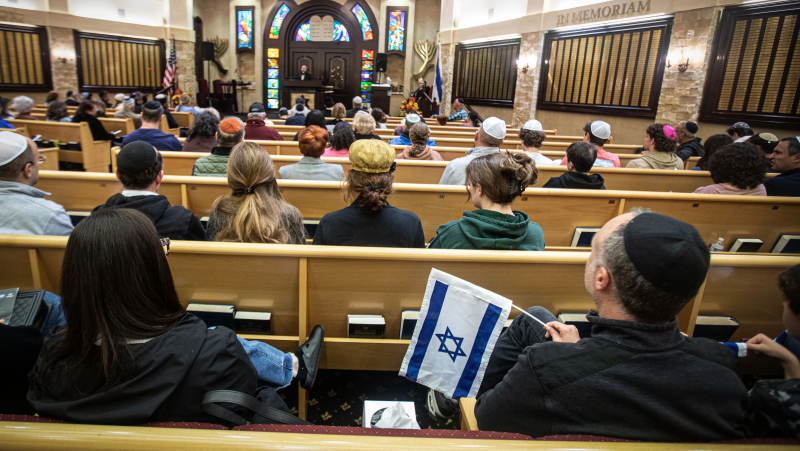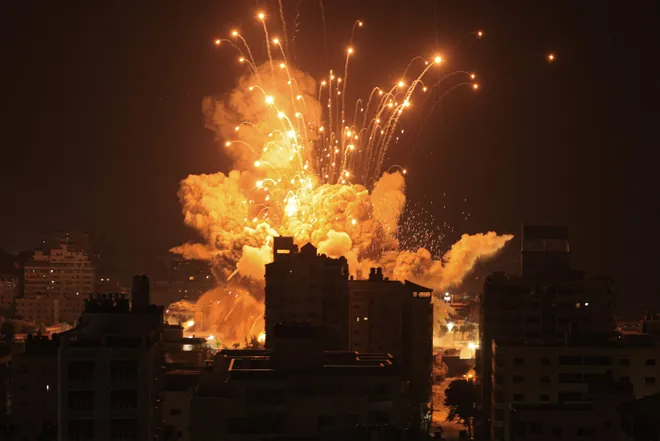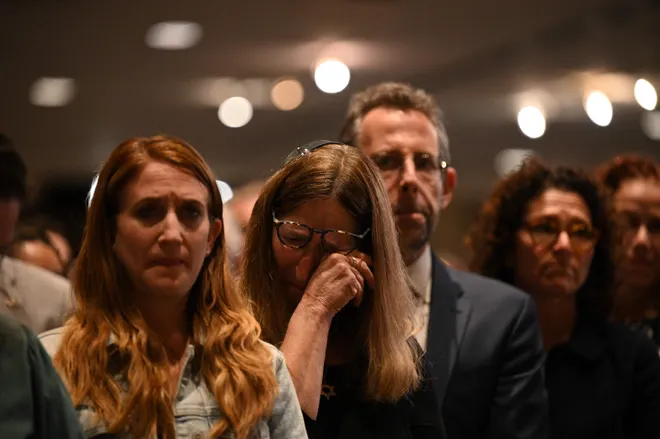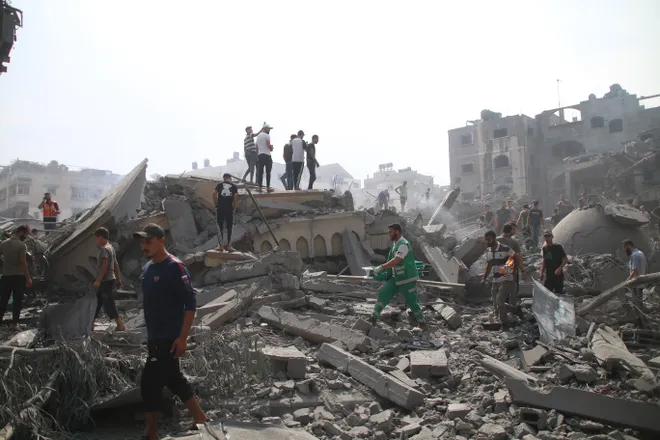'Always worried about our safety': Jews and Palestinians in US fearful after Hamas attack
Two days after the surprise deadly holiday attacks by Hamas in Israel, many members of Cantor Benny Rogosnitzky's synagogue in Manhattan were still in disbelief. Somehow, he said, he had to summon the strength to support them.
"They can't imagine that this is what's happened," Rogosnitzky, who oversees Park East Synagogue in Manhattan, said Monday. "I mean, there were parents in the school who came today to the services who said, 'I feel like this is a nightmare. When am I waking up?'"
Across the country, Melissa Chapman of Oakland, California, said there are almost no words to describe the deep heartbreak and devastation that’s being felt within Jewish and Israeli communities throughout the nation.
“There’s an unspoken deep bond and connection that no matter where we are, we have this shared pain,” said Chapman, chief executive officer of the Jewish Community Center in neighboring Berkeley. “We’re always worried about our safety. Here and abroad.”
Ripples of fears for their own safety, tears and countless prayers for an end to the violence traveled through Jewish, Israeli and Palestinian-linked communities in the United States this week following the onslaught by the Palestinian Islamist group Hamas Saturday morning. Some groups held prayer meetings, while others worried about local attacks, immediately beefing up security and urging community members to be vigilant as the death toll overseas from the battle climbed above 1,600, including at least 11 Americans.
Osama Abu Irshaid, executive director of the Virginia-based nonprofit Americans for Justice in Palestine, said he was “not surprised” by the attack, widely seen as the worst escalation in the Israel-Palestine conflict in at least 50 years, saying tensions had been "accumulating over decades and decades."
Irshaid said Palestinians, particularly those in Gaza, are “demanding to live free lives.” “They have been prevented from basic human rights,” Irshaid said. "Of course, we want to see this come to a peaceful resolution…but the history cannot be ignored."

Rabbis and congregations mourn death toll in Israel
The attacks came toward the end of Sukkot, a weeklong celebration marking the time Jews lived in the desert after escaping slavery in Egypt. As news of the tragedy spread, many Jewish and Israeli communities in the United States shifted from celebrating to holding vigils, gatherings and protests.
Rabbi Haim Dov Beliak, a Jewish faith leader retired from Congregation Beth Ohr in Studio City, California, said three Muslim friends who had shared his Shabbat table in the past reached out Monday to share their sympathies.
"From the Palestinians that I know, there's a sadness. There's no celebration," he said.
In Palm Beach County, Florida, Rabbi Alon Levkovitz, who leads Temple Beth Am in Jupiter, said the news horrified his community, which was preparing to celebrate Simchas Torah, a holiday marking the completion of the annual reading of the Torah.
"I am devastated," said Levkovitz, whose family lives in Israel. "Nothing like that has happened before. There were many terrorist attacks, but nothing like that. Only God knows what happened."
Rabbi Gregory Marx said his Philadelphia-area synagogue, Congregation Beth Or, would convene extra prayer sessions in response to the crisis. On Sunday, about 500 people gathered in the sanctuary in support of Israel and the community.
"For the next five days, we will have services of prayer and reflection and support, and then I will speak about Israel on this coming Shabbat Friday night," Marx said.

His synagogue is also encouraging people to attend a rally on Tuesday sponsored by the nonprofit United Jewish Appeal Federation in front of the United Nations. The synagogue is also doing a toy drive for children whose homes have been devastated and who lost their parents in Israel.
"We're generally out there tapping into the feelings of the community to be supportive one-on-one, but also as a whole community to rally with Israel," Rogosnitzky said.
American Jews worry for family, friends in Israel
When Lior Zisser-Yogev woke up Saturday morning in her Bloomfield Hills, Michigan, home, her phone was filled with texts and WhatsApp messages from family and friends in Israel.
The country was under attack, but it wasn't initially clear what was happening and the scope of it, recalled Zisser-Yogev, who used to live in Israel. Her parents had been visiting southern Israel at the time of the attacks and got trapped trying to drive back home.
"My parents were stuck," Zisser-Yogev said. "They were on their way back home from the southern region of Israel. But they were told by the police, that they shouldn't keep going because there's something going on, they didn't really know what it was. ... Thank God they were able to go in a different route and reach home."
Zisser-Yogev, who works at the Jewish Federation of Metropolitan Detroit as a program and education director, said she has friends in Israel who had children at a music festival that was attacked by Hamas. She said she also has another friend who's a teacher with several students who are missing.
"I just hope that this will end soon, and with as few casualties as possible," Zisser-Yogev said.
Rabbi Shmuel Gancz of the Chabad Jewish Center of Suffern on Montebello, New York, was working Monday to find out information about a community friend who was among the kidnapped and working to support reservists who were being called up as Israel shifted into war. Gancz said he was also working to get more supplies to the returning soldiers.
"We firmly believe that every good deed that one of us over here has a drastic effect of saving lives in Israel," he said. "Adding more goodness and kindness to this world.”
Ryan Brown, of Chicago, woke up on Saturday morning to a phone filled with notifications from his family and friends, alerting him to the situation in Israel. Brown has many friends in Israel and lived there for several months on two separate occasions. He has visited more than a dozen times.
“I was just in shock and horror and disbelief that this is real,” the 30-year-old says. “It was such a grave attack that it was hard to really understand that this is happening.”
Jews in his community feel “sad and helpless," he said. His social media feed is where he gets a lot of his updates, but they are hard to watch.
“It’s jarring to see the videos," he said.

Jews worry about hate attacks on US soil
Some communities are also increasing their security as a precaution. Rabbi Gregory Marx said Phildelphia's Congregation Beth Or increased security measures over the weekend amidst heightened fears.
“The Jewish community is always concerned when hostility and anger and hate raise its head,” said Marx, the Philadelphia rabbi. “Unfortunately, we're living in a world where we need to have security at our synagogue. That was not the case when I became a rabbi, but it is certainly the reality now."
Chapman said her community center in Berkeley will be taking similar measures, but declined to get into specific details. She believes similar facilities in Jewish communities nationwide will also take appropriate security steps as it has become the norm.
Last year saw the highest number of antisemitic incidents against Jewish Americans ever recorded by the Anti-Defamation League, a Jewish civil rights group that has been tallying attacks on the Jewish community since 1979.
Antisemitic incidents have hit record highs across the United States in recent years, according to an annual audit from the Anti-Defamation League, a Jewish civil rights group. Most of these incidents involved harassment, assaults and antisemitic vandalism.
In Los Angeles, the nation's second-largest school district said in an email to students and parents that in addition to taking "appropriate and immediate action to respond to any and all threats," it also laid out how it will talk about the conflict with students.
"We incorporate discussions about global conflicts, including the recent development in Israel, into our curriculum in an age-appropriate and sensitive manner," the district said. "With these open discussions in safe places, we can empower our students to become informed global citizens."
At the University of California, Berkeley, Rabbi Gil Leeds said there will likely be more security this week as vigils and protests over the conflict will emerge. "I don’t want to think about what it’s going to look like here and, on campuses across the country. It’s already been uncomfortable in past years. It’s not promising," Leeds said.
Violence in Israel 'didn't just start yesterday'
Many Palestinian rights supporters from various communities throughout the United States said they were horrified by the violence and also wanted peace.

Janan Najeeb, president of the Milwaukee Muslim Women's Coalition, said Palestinians have been "constantly killed and oppressed" and the war stems from decades of Israeli oppression.
She criticized Israel for cutting off water, food and electricity to Gaza since the war began, saying it amounted to "ethnic cleansing."
On Monday, Najeeb heard of two Milwaukee men whose relatives in Gaza had been killed. One lost his sister and another lost his cousin. Both were civilians, she said.
"We mourn the lives of every Israeli and every Palestinian because every life is equal, and every human deserves the right to live in peace and in dignity," Najeeb said.
Rania Mustafa, executive director of the Palestinian American Community Center in New Jersey, said that while she does not support violence, she said she believes the weekend’s escalation of violence was the result of Israel's occupation.
“For Palestinians, things didn't just start yesterday or the day before,” she said. “Palestinians want liberation."
Palestinian Americans she has spoken with are anxious and fearful of retaliation against Palestineans from Israel throughout the Middle East.
“I spoke with a friend today… 15 members of his family were killed in Gaza,” she said. “It’s very scary and we’re only expecting more to come.”
Muhammad Sankari, of the Chicago-based United States Palestinian Community Network, said local Palestinian families have been searching for news of their loved ones in Palestine.
“There are numerous people in our community who are terrified, waiting, trying to contact family members in Gaza, trying to contact family members in other areas, hoping that they don't receive the news that they've been killed,” he said.
Nadim Ali, the imam at the Community Masjid of Atlanta, said the sentiment among the many Palestinian Americans he has spoken with since Hamas’ attack on Israel has centered on peace and prayer for innocent lives.
“We’re worried that so many people, innocent people, will be killed,” Ali said. “It doesn’t have to be that way.”
'Complete siege'Israeli retaliation to be felt 'for generations'; Hamas threatens hostages: Live updates
A timeline of the conflict:Why the 2023 Israeli-Palestinian fighting is among the most brutal in years
USA TODAY Network reporters Valentina Palm of the Palm Beach Post in, Florida; Niraj Warikoo of the Detroit Free Press; Nancy Cutler of the Journal News in New York; and Sophie Carson of the Milwaukee Journal Sentinel contributed.
Disclaimer: The copyright of this article belongs to the original author. Reposting this article is solely for the purpose of information dissemination and does not constitute any investment advice. If there is any infringement, please contact us immediately. We will make corrections or deletions as necessary. Thank you.






